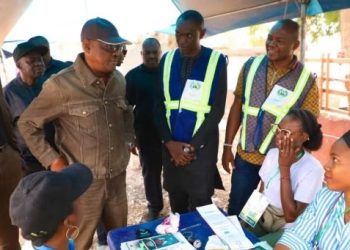The National Identity Management Commission (NIMC) has announced that enrolment in the National Identity Number (NIN) system has grown from 72.7 million in 2022 to over 122 million by July 2025 a 49% increase in just over three years.
The Director-General of the Commission, Engr. (Dr.) Abisoye Coker-Odusote who disclosed this during two-day roundtable workshop with Association of Corporate Online Editors (ACOE) on Thursday in Abuja with the theme:”Building Trust in Digital Identity: Strengthening Media Partnerships for a Secure and Inclusive Ecosystem”.
Coker-Odusote, ably represented by the Special Project Director, Dr. Alvan Ikoku added that increase in NIN enrollment has enabled millions of Nigerians to access services in education, health, agriculture, and financial sectors, further empowering the country’s underserved populations. She highlighted the transformation of Nigeria’s identity ecosystem from a fragmented and exclusionary system to a people-centred, secure, and unified platform.
She highlighted the transformation of Nigeria’s identity ecosystem from a fragmented and exclusionary system to a people-centred, secure, and unified platform.
According to her, “The Commission’s investment in digital infrastructure, automation, and backend upgrades has improved service delivery, with special tools such as the NINAuth mobile app, Self-Service Enrolment app, with the already deployed Contactless Biometric Solutions”.
The DG who said this event is a bold move to strengthen public trust, deepen transparency, and promote inclusive access to digital identity in Nigeria, hailed the vital role the media plays in shaping public discourse, promoting government transparency, and serving as a bridge between policy and the people. “You have reported our highs and lows, challenged us to do better, and supported us with your platforms. Today, I ask that we deepen this collaboration to ensure every Nigerian understands the value of identity, their rights, and the impact of digital inclusion,” she noted.
“You have reported our highs and lows, challenged us to do better, and supported us with your platforms. Today, I ask that we deepen this collaboration to ensure every Nigerian understands the value of identity, their rights, and the impact of digital inclusion,” she noted.
The DG charged the media to become co-builders of Nigeria’s digital identity revolution through accurate reporting, advocacy campaigns, and grassroots awareness creation. emphasised the need for public education to bridge digital literacy gaps and ensure that no Nigerian is left behind.
The Project Coordinator of the Nigeria Digital Identification for Development (ID4D), Mrs. Tito Ejanavi reaffirmed the company’s support for inclusive enrolment efforts, especially among vulnerable groups such as women, persons with disabilities, children, and rural dwellers.
She said ID4D project was funded by the World Bank, French Development Agency, and European Investment Bank and through this project, over 7,167 Front-End Enrolment Agents have been trained and deployed nationwide.
“In addition, infrastructure upgrades, biometric identification improvements, and strategic reforms have enhanced national enrolment coverage, equity, and security. We are not only investing in systems but in people.
“Through workshops, stakeholder dialogues, and grievance redress training, our teams are now better positioned to serve Nigerians more effectively,” Ejanavi said. Earlier, in his address, President of the Association, Shola Akingboye praised the NIMC’s efforts and reiterated the media’s commitment to transparency and public education. “The right of Nigerians to know is essential for governance. We assure NIMC of our unwavering support as watchdogs and partners in this national assignment”.
Earlier, in his address, President of the Association, Shola Akingboye praised the NIMC’s efforts and reiterated the media’s commitment to transparency and public education. “The right of Nigerians to know is essential for governance. We assure NIMC of our unwavering support as watchdogs and partners in this national assignment”.
He acknowledged previous roundtable engagements, including one in November 2024, and emphasised the importance of sustained dialogue between NIMC and online media space to dispel misinformation and educate citizens about the value of identity management.
With over 172 million SIM-NIN linkages, 3 million farmers and 800,000 students already benefiting from identity-linked services, NIMC’s digital identity drive continues to redefine access.











